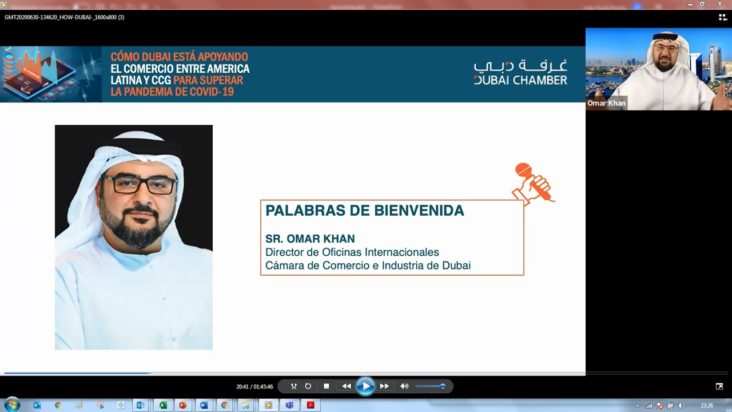Latin America’s Covid-Led Digital Shift Creates New Opportunities For Dubai Businesses

A new wave of rapid digitalisation in Latin America is creating plenty of new business opportunities in e-commerce, digital trade digital services and logistics, which companies in Dubai can capitalise on as they prepare for a post-Covid recovery, industry experts said during a recent webinar organised by Dubai Chamber of Commerce and Industry.
The webinar, titled How Dubai is supporting LatAm-GCC trade to Overcome the Covid-19 Pandemic, was attended by more than 250 participants from South America, Central America, the UAE and other markets, representing a wide variety of economic sectors.
Presentations during the virtual event shed light on key trends reshaping Latin America’s foreign trade and business landscape, including the disruption of supply chains, a widespread shift towards digital platforms and a keenness among Latin American companies to diversify exports markets and forge new trade partnerships.
Addressing participants, Omar Khan, Director of International Offices at Dubai Chamber noted that Dubai, as a global smart city, offers a wealth of expertise in digital services, e-commerce and advanced technologies, which it can lend to Latin American companies as they adapt to a changing business landscape, in addition to the emirate’s strategic position that can help traders diversify exports and expand their reach Middle East, Africa and Asia.
Dubai-Latin America non-oil trade exceeded $7.6 billion in 2019, marking a 23% increase compared to 2017 ($6.2 billion), Khan revealed, adding that there is vast untapped potential that still needs to be explored by businesses on both sides. He noted that Dubai Chamber’s representative offices in Panama, Brazil and Argentina are actively exploring promising markets across Latin America and identifying opportunities that offer potential to member companies.
“As we move into the post-pandemic era, businesses in Dubai and Latin America should align their efforts as they adapt to the new trade landscape, whether it be forging trade partnerships or sharing knowledge. There is plenty of room for resource-rich countries such as Brazil and Argentina to expand cooperation with the UAE on food security, while Panama can serve as a strategic logistics hub to re-export Latin American products to Dubai and the wider GCC region,” said Khan.
Fabrizio Opertti, Manager of the Integration & Trade Sector at the Inter-American Development Bank, spoke about pressing challenges currently being faced by several Latin American markets, such as restrictions on imports and exports and a surging demand for medical and food products.
The digital market in Latin America grew by 50% per year between 2016 and 2020, Opertti revealed, mentioning remote learning and education as a prime example of an industry witnessing a surge in activity due to Covid-related movement restrictions.
Gonzalo Mórtola, Commercial Director of IAMECA Logistics & Supply, said logistics players are in a unique position to show to the world what LatAm produces and what Dubai needs and vice-versa. He stressed the importance of transparency and predictability in ports management to lower operational costs and said Argentina and other Latin American companies are looking to diversify the supply changes and reduce their reliance on single markets such as China.
Michael Bentley Director of Business Planning and Development at DP World Americas, highlighted the importance of Latin America as a key partner working with the UAE to ensure its food security and noted that
DP World has kept all its terminals working to ensure global trade flow and help countries in the region navigate new warehousing and supply-related challenges.
Tradeling.com, an eMarketplace for MENA business buyers, was mentioned as a case study of a Dubai-based company that is creating new digital channels that can be used to help businesses source and procure products. During the webinar, the company’s CEO Muhammad Chbib noted that Tradeling.com acts as a moderator to give a human touch to virtual trade-focused negotiations, and spoke about how Covid-19 has changed business norms, forcing companies and investors to become more willing to conduct business online.


